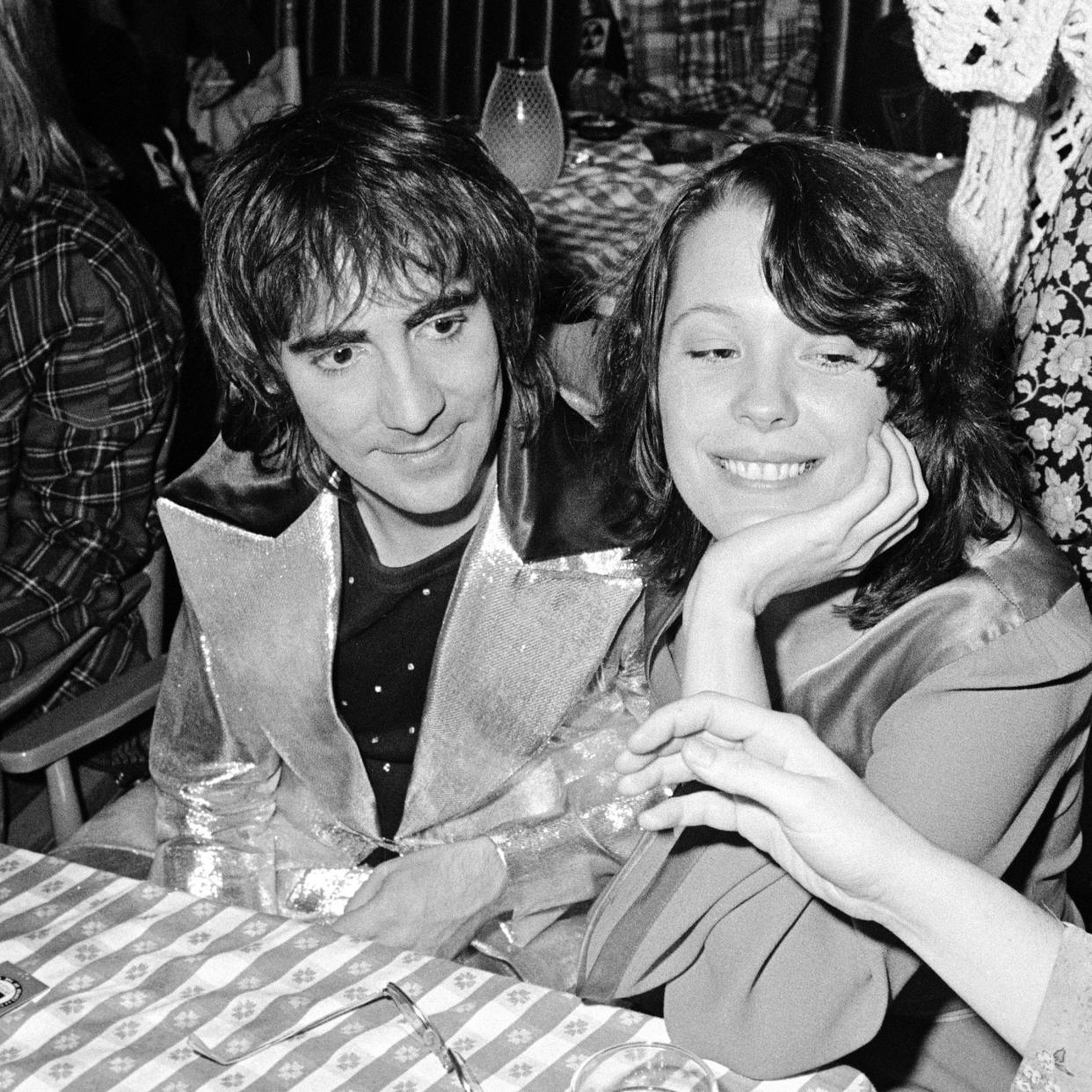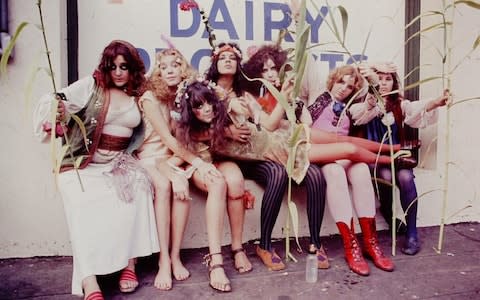Queen of the groupies Pamela Des Barres: 'Young, hot little girls wanted these rock stars – they insisted on it'

As her rock memoir is republished, legendary Sixties groupie Pamela Des Barres tells Neil McCormick why she was no victim
Pamela Des Barres is the world’s most famous groupie. And she’s proud of it. “I’ve been called the national slut,” laughs the 69-year-old Californian. “It’s such uptight bullshit.” She prefers to consider herself “a sexual pioneer” and feminist. “I was a young woman doing what I wanted, against the odds, in a man’s world. That's feminism to me.”
Des Barres’ notoriety stems from her 1987 memoir, I’m With The Band, which is republished in a new anniversary edition this month. It is a vivid, passionate account of a girl coming of age in the LA music scene of the late Sixties and early Seventies. “God, it was such a time. There was nothing like it before, I think, and nothing like it since.”
Des Barres had wild affairs with Jimmy Page, Mick Jagger and Keith Moon and briefer, but equally torrid, liaisons with Jim Morrison, Gram Parsons and Waylon Jennings. She hung out with Jimi Hendrix, Captain Beefheart, Frank Zappa, Alice Cooper, The Doors, the Flying Burrito Brothers, Ray Davies, Led Zeppelin, The Who and The Rolling Stones.
She briefly dated Woody Allen and lived with Don Johnson. Jeff Beck, Rod Stewart and Lowell George all played on an album she recorded with short lived girl group the GTOs (a flexible acronym for her groupie pals that “stood for Girls Together Outrageously , Orally or anything else starting with an O”). Des Barres was an inspiration for groupie Penny Lane, played by Kate Hudson, in Cameron Crowe’s 2000 rock drama Almost Famous. “It pisses me off,” she snorts. “They stole my persona.”
She still dresses with a glamorous mix-and-match hippie flair, although her once blonde hair is now dyed red. Single since her divorce from the British actor and rock singer Michael Des Barres in 1991, Des Barres is an author, journalist and creative writing teacher. She insists she only has regrets “for things I didn’t do” when opportunities arose.
“If I could go back, I would have said yes to Jimi Hendrix. What was I thinking? And I would have gone on a date with Elvis Presley when he asked. I wanted to be faithful to Michael. When I told him he was like, ‘What? You turned down Elvis? I would have gone!’ Everyone gets a free pass for Elvis.”
Groupie culture might be frowned upon by today's #MeToo campaigners, but Des Barres believes that that attitude rests on a fundamental misunderstanding.
“People think groupies were submissive but there was no coercion. Music is the universal soulful language of humanity, you know, and people who love it want to express themselves to musicians who make them feel that way. That’s always going to happen.”

Growing up in the Sixties, the teenage Pamela Miller (her family name) was passionate about music, but could not see a career in it, even though she majored in English and maintained copious diaries about every detail of the band scene.
“I really had no role models, whatsoever. I never met a female journalist. The way you could participate and spend time with musicians was to be a groupie.”
Frank Zappa spotted the potential of the wild troupe of girls who danced at his gigs and produced one weird and wonderful album with the GTOs, Permanent Damage, in 1969. “Frank was like a walking brain. Genius barely covers it. There was really no precedent for what we were doing. We were so outrageous, really fearless girls, and he wanted to capture that moment.”
It came to an end when many of Pamela’s band mates developed serious drug problems. "Frank was tee-total. That’s why he broke up the band.” Zappa, however, hired Pamela as nanny for his children, Moon Unit and Dweezil.
Des Barres is insistent that being a groupie was never just about sex. “We wanted to dress rock stars, we helped Alice Cooper with his make up, I sewed buttons on Jimmy Page’s shirts when they fell off. It was about looking after them in a joyous way.”
But there was a lot sex, too. She talks about the awe she felt the first time she slept with Mick Jagger. “It kind of took me out of the moment," she says. "But it got better.”
Many of the stars Des Barres loved died young, in tragic circumstances.
“It was a new reality, and people were willing to go out on the furthest limb. Drugs were so prolific. I was with Hendrix in New York, we went to a party at (Andy Warhol’s) Factory. And as we walked through, all three members of the band held their hands out and got drugs dropped in. And they took them all. I mean, they could have died right there on the spot.”
She asserts there was very little understanding of the dangers of substance abuse. “People with addictive personalities just kept going until they passed out, or completely made fools of themselves.” Jim Morrison, the “most beautiful, sensual man” was “just a terrible drunk. You know, we’d have to step over him in the gutter, cause he was laying there puking. So he lost some allure in my eyes.”
Keith Moon, she thinks, would be diagnosed bipolar today. “He was medicating himself the best way he knew how, to contain himself. Trying to keep up with his highs and lows was not an easy task. The substances he chose to imbibe would calm him, they would solve a momentary problem. Nowadays he would probably be OK if he found the right doctor.”
She observed Gram Parsons becoming addicted to heroin under the influence of his hero Keith Richards. “He scared me,” she says of Richards. “He was surly and dismissive and I didn't want to be around him. Mick was always in control. Robert Plant too. Amazing characters. Because neither of them were addictive personalities. It made all the difference.”

The scene became darker in the seventies. “We believed the rock renaissance was going to change the world. But cocaine just wrecked people and made them think they were Jesus. The guys started getting away with more because the girls were willing.”
One of the great loves of Des Barres' life was Page, a rock star who has come to epitomise the unease many people now feel about the excesses of that period. Des Barres was Page’s LA lover on-and-off from 1969-73. “Jimmy is a mysterious guy. He was very dark and moody and dangerous but incredibly romantic and persuasive. He had many girlfriends, and we all thought we were the only one.”
Groupie Lori Maddox alleges her affair with Page began in 1973, when she was only 15 years old. A recent biography, David Bowie: A Life, by Dylan Jones, contains Maddox’s first-person account of how Bowie took her virginity at 14.
“It was a different reality, somehow. These young, hot little girls wanted these rock stars - they just insisted on it. It wasn't like Jimmy and David went after these kids. It was the opposite.” Asked where Des Barres draws a line regarding imbalances of age and power in a sexual relationship, she responds: “It's a fictitious line. [Sex] is an individual expression of desire. Everybody's different.”
Yet the arrival on the LA scene of a group of very young, territorial groupies she refers to as “the teenage babies” made Des Barres consider whether it was time to settle down. “I was nineteen when I first got laid. I was pretty late to the game.” But she refuses to be judgemental. “Lori’s 60 and has no regrets at all. She says it was the best time of her life.”
In the age of #MeToo, does she think rock stars have cause to be nervous about past behaviour?
“Yeah, I’m sure. There were plenty of under-age girls all over the place. It's not acceptable now and it wasn't acceptable before that time, and I think that’s right.”
Des Barres displays a tangible unease on the issue, repeatedly stressing the liberated spirit and drug induced madness that blurred the boundaries of behaviour. She talks vaguely of “a pocket of time” when all rules were effectively suspended. Yet pressed on the matter, she seems to acknowledge her wistful nostalgia for the era is not really an excuse.
“Obviously girls at that age don't really know what they want. And the men, yes, they were taking advantage of them.” She does not believe there will ever be legal consequences, however. “It was a long time ago. None of them are complaining. (The girls) remember those days incredibly fondly as a real stand out period in their lives.”
She still meets women who identify as groupies but “it's harder to meet the really big stars. We used to walk into the Whiskey A-Go-Go and you only had to have a certain pizzazz to attract attention.” Des Barres suggests today’s stars are more protected from the public, dating models and actresses rather than the starstruck fans of yore. But she also points out that women obsessed with music have different options now.
“They can become a journalist, photographer or a rock star themselves. So it's changed in every kind of way. That was just a time period that, in good ways and bad, is never going to come again.”
I’m With The Band by Pamela Des Barres (Omnibus Press, £14.99) is out now


